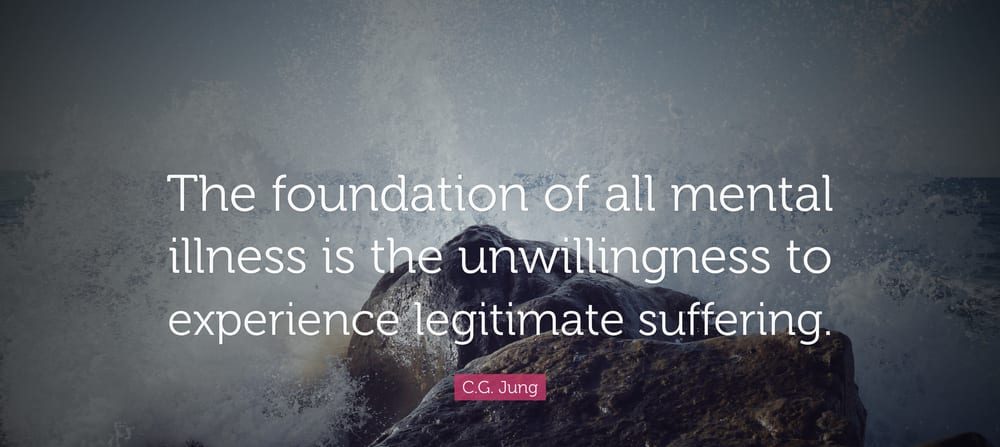
Conventional approaches treat anxiety and depression as though anxiety and depression are the problems in and of themselves, rather than the symptoms of an underlying imbalance in the whole person. Analytical Psychology, the psychological approach to suffering developed by C.G. Jung, is very different from traditional methods of psychology or psychotherapy. To illustrate the differences, I focus in this article on anxiety and depression because they are worldwide problems.
One cannot treat the psyche without touching on man and life as a whole.C.G. JungEach approach to therapy focuses one particular dimension of a person, treating only the various manifestations of anxiety or depression. For example, the medical approach says it’s a chemical imbalance and so uses pharmacology to treat the imbalance. Cognitive behavioral therapy states that distorted beliefs or thoughts cause negative actions or feelings and so works to change those distorted patterns by reinforcing not-so-distorted patterns.
Psychological suffering is not just a mental or chemical imbalance. To think of it in this way is to fall victim to the misconception of the mind/body split. We are whole beings. Whenever we suffer, that suffering expresses itself at every level. Anxiety and depression affects the whole person: psycho-spiritually, physically, mentally, and physiologically. The signs and symptoms of anxiety and depression will manifest at every level.
Table of Contents - Jump To Section
Anxiety and Depression: A holistic perspective
Healing comes only from that which leads the patient beyond himself and beyond his entanglements with ego….C.G. JungFrom the Jungian point of view, psychological suffering is a signal that something in our whole life is out of balance, and certain states of anxiety and depression are no exceptions.
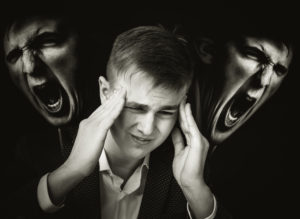 I think that either of the approaches mentioned above can be good for treating acute symptoms of anxiety and depression. Medicine can certainly help snap someone out of a potentially life-threatening mood disorder. But to medicate someone to the point where they can no longer feel is not curative; it’s injurious. Human feeling is what makes us human.
I think that either of the approaches mentioned above can be good for treating acute symptoms of anxiety and depression. Medicine can certainly help snap someone out of a potentially life-threatening mood disorder. But to medicate someone to the point where they can no longer feel is not curative; it’s injurious. Human feeling is what makes us human.
Cognitive-behavioral techniques for breaking down destructive reactions and thought patterns can help you separate your true self from the destructive thoughts and feelings that come with anxiety and depression, but you cannot simply re-program yourself to think better thoughts and expect to be truly healed.
You have to take a conscious standpoint against those thoughts and moods, something I talk about in the second part of this article.
Cognitive Behavior Approach to Recognizing Destructive Patterns
I want to borrow from the cognitive-behavioral classification of negative thought/emotional patterns because these categories are easily recognizable in both anxiety and depression. In Jungian analytical psychology, we also see similar patterns emerging around psychological complexes, something I explain later. Wherever I can, I’ll note possibilities for Jungian analysis to each category so you can see what I mean by underlying issues.
Recognition of your habitual patterns is a key factor in learning how to consciously face anxiety and depression.
These habitual reactions and thought patterns include:
- Polarized Thinking
- all-or-nothing thinking: viewing the world in absolute, black-and-white terms
- often associated terrible childhoods, e.g. unloving or otherwise abusive parents
- Filtering
- disqualifying the positive: rejecting positive experiences by insisting they “don’t count” for some reason
- often associated with negative mothers
- Automatic negative reactions
- having habitual, scolding thoughts
- parents who constantly scolded or judged
- Catastrophizing
- magnifying or minimizing the importance of an event: making a bigger deal about a specific event or moment
- repeated exposure to disappointment by a trusted caregiver
- Over-generalization
- drawing overly broad conclusions from a single event
- Personalization
- taking things too personally or feeling actions are specifically directed at you
- Jumping to conclusions
- immediately judging a situation without reflection
- Control fallacies
- external control fallacy: we are helpless victims (I can’t help it! syndrome)
- internal control fallacy: we are responsible for how others feel (did I do something wrong? syndrome)
- childhood and family relationship issues
- Fairness fallacies
- judging everything in terms of fairness
- childhood and family relationship issues
- Blaming
- holding others responsible for how we feel about ourselves
- never feeling loved by primary caregivers
- Shoulds
- imposing our particular rules on others
- terrible injustices suffered as a child
- Emotional Reasoning
- buying into what you feel about reality when it may not be the truth about reality: I feel stupid, so I am stupid. They didn’t invite me because they hate me.
- lack of development in the thinking function
- Global Labeling
- generalizing a few qualities into a global, hyper-emotionally charged negative judgement: someone you don’t like is automatically a jerk
- Always being right
- striving to prove you are right/getting the last word
- Reward/Punishment
- expecting sacrifice and denial to payoff or scorekeeping
- unresolved religious conflicts
Recognition of your patterns around anxiety and depression
As far as we can discern, the sole purpose of human existence is to kindle a light in the darkness of mere being. C.G. JungRealizing your destructive patterns is the reductive part of your healing process. Reduction is a process of breaking down your habitual reactions and thoughts. You have to catch yourself whenever you’re auto-responding.
My problem with the cognitive behavioral approach to treatment is that it relies too heavily on the rational function and its supposed power to explain away symptoms. Anxiety and depression also have irrational factors that can’t be intellectualized out of existence. If only it were that easy!
 And as far as simply re-programming the mind, changing the manifested pattern does not change the underlying problem. Whether it’s through Jungian analysis, counseling, or psych-education, our goal is to discover not only the source of your anxiety and depression, but also the course we need to follow in order to heal the psychic situation.
And as far as simply re-programming the mind, changing the manifested pattern does not change the underlying problem. Whether it’s through Jungian analysis, counseling, or psych-education, our goal is to discover not only the source of your anxiety and depression, but also the course we need to follow in order to heal the psychic situation.
That last part – following the course to healing – is unique to Jungian psychology. This course of healing is directly linked to finding the meaning in the darkness of anxiety and depression.
Now, I know that some people denigrate the value of finding meaning, but that’s only because they themselves lead meaningless lives
Some of us are inexplicably drawn into finding the meaning of our extraordinary life experiences, regardless of how traumatic those experiences were. Once we’ve broken down the issue and unpacked all of the negative thoughts, emotions, and behaviors which revolve around that issue, we have to build ourselves back up. In opposition to the reductive method, Jung called this part of psychotherapy constructive.
My experience with anxiety and depression
I speak about these things from the depths of my own life experiences. I don’t say anything just because Jung said it. Never would I encourage anyone to go down a path that I had not traveled myself. For example, I lived for decades with a diagnosed generalized anxiety disorder and chronic insomnia. Now, I could point to any number of childhood experiences that could explain why I was constantly anxious and sleepless as an adult, but knowledge of that connection did me no good. Taking medication to alleviate the chemical imbalance caused by repeated stress in my life also did not help me.
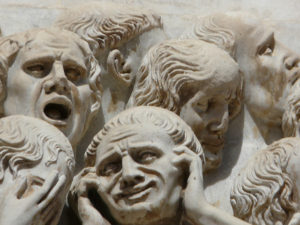
Sculpture from Orvieto Duomo facade
There was some irrational factor that kept bursting up like a geyser and wiping out any newfound revelations regarding my childhood and my distorted perspective. I had identified in myself virtually every one of those categories on that cognitive behavioral list though not with CBT. My method was yoga and C.G. Jung. In order to unravel those distorted patterns, I had to surrender to accepting some disgusting experiences in my life. There was just no amount of medicine or re-programming that was going change any of it.
I have learned more about myself from looking at those times of abject confusion and despair than from looking at any others. It took me a very long time to understand my psychological pain from this perspective, but when I finally did, the way I saw my anxiety and depression changed.
If we can face our suffering consciously, rather than identifying with it, then we have an opportunity to grow from it, both psychologically and spiritually. This is what Jung meant by the above quote: we must be willing to experience legitimate suffering.
Anxiety, Depression, and Legitimate Suffering
Of course, this begs the question, “What is legitimate suffering?”
If you say that you suffer from anxiety or depression and leave it at that, then you are not legitimately suffering. No doubt that you are suffering, but not from your anxiety or depression. As I said, those are symptoms – reactions from within to a psychic illness, much like a fever is a reaction to a physical illness. And just as a fever is an attempt at physical healing, symptoms of anxiety and depression are also attempts at psychic healing.
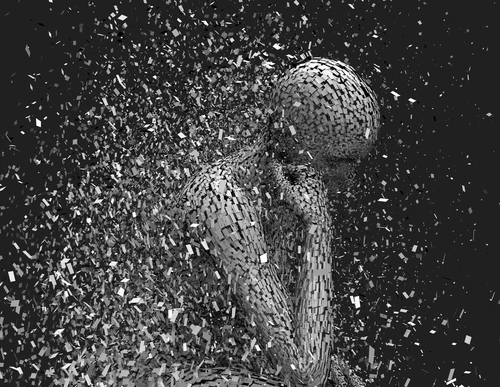
In order to claim legitimately suffering, you must ask some questions: “From where does this anxiety and depression come? Why does it come? To what purpose does it happen?” These are very deep questions. In order to find the answers, you have to dig deep – and I mean really deep.
In my experience working with clients, I never cease to be amazed at how easily people gloss over or push aside painful experiences, especially those which happened in childhood. Others, like myself, get stuck in the rage and sense of injustice without experiencing the profound grief of losing a childhood.
Unresolved terror, rage, grief, or any other emotions that we push aside or suppress – these are the places we have to go in order to get to the roots of depression and anxiety. Once you find yourself in the midst of those emotions, you then have to turn them inside out, as Jung suggests below in his letter to a depressed friend.
Anxiety and Depression: Why Me?
Jung suggested that we always ask ourselves: “Who am I that all this should happen to me?” To find the answer to this fateful question he will look into his heart.”
I can tell you that sometimes you look in your heart and see only an endless black hole, and sometimes there is only one thing you can do— let yourself fall into it.
As Jung says about this falling inward in a letter to a depressed friend:
When the darkness grows denser, I would penetrate to its very core and ground, and would not rest until amid the pain a light appeared to me, for in excessu affectus (in an excess of affect or passion) Nature reverses herself. I would turn in rage against myself and with the heat of my rage I would melt my lead. Next I would renounce everything and engage in the lowest activities should my depression drive me to violence. Then I would wrestle with the dark angel until he dislocated my hip. For he is also the light and the blue sky which he withholds from me.
If you know anything about Jung’s Red Book, then you know that he too wrestled with the dark angels of anxiety and depression.
Anxiety and Depression: Getting to the core
You get to the core of these states through an intentional act of introversion, something like meditation. You have to start with the mood itself. If depression feels dark, then enter that feeling of darkness. If anxiety feels like fear, then enter the feeling of that fear. Don’t attach to any external meaning for your feeling, for example lost jobs, broken relationships, chemical imbalances, or bad childhoods. Move past that.
What you’re trying to do is harness the raw energy that’s behind the anxiety or depression – that’s where the numinous experience is. Remember that Jung said “the gods have become diseases.” Seen from this perspective, anxiety or depression is an inner calling from the gods within.
Once you can reach that raw energy state you have to sit with it. Now, there’s a tremendous amount of tension in this raw energy, and, it can be quite difficult to bear it. Don’t get pulled back into blaming some external cause. Stay with the tension of that raw energy. One of Jung’s most amazing Red Book discoveries was that this raw energy will form an image of itself – an image with which you can have a dialogue. Psyche speaks in imagery. This same power is behind our dreams.
In a letter to Vera von Lier-Schmidt Ernsthausen, 25 April 1952, Jung wrote:
I have observed, for example, that as a rule when “archetypal” contents arise spontaneously in dreams, etc., numinous and healing effects emanate from them. These are primordial psychic experiences that very often reopen a patient’s access to religious truths that have been blocked. I have also had this experience myself. . . .
Again, reflect on these questions during your dark phases of anxiety and depression:
From where does this anxiety and depression come?
Why does it come?
To what purpose does it happen?
Who am I that all this should happen to me?
When you can answer the first two questions, then you know from what you are truly suffering. And then from there, you must endure it until your suffering breaks open and reveals its healing qualities. This will answer the next two questions. When you can do this, you will eventually tap the sublime springs of your inner resources of healing, something I talked about in my post on the Power of Silence. In short, those inner resources spring from what Jung called the archetypes.
Up to this point, I have talked about the meaning and purpose of anxiety and depression. Now, let’s take a look at how these mindstates can emerge.
Psychological Complexes
Anxiety and Depression from the 13th Century Perspective
The 13th century poet Rumi wrote a beautiful poem called the Guest House that describes exactly what I mean:
This human being is a guest-house
Every morning a new arrival.
A joy, a depression, a meanness,
some momentary awareness comes
as an unexpected visitor.Welcome and entertain them all!
Even if they’re a crowd of sorrows,
Who violently sweep your house
empty of its furniture.
Still, treat each guest honorably.
He may be clearing you out
for some new delight.The dark thought, the shame, the malice,
meet them at the door laughing,
and invite them in.
Be grateful for whoever comes,
because each has been sent
as a guide from beyond.~Rumi
Anxiety and Depression: Unwanted Guests or Heralds for Change?
Anxiety attacks and depression can come out of nowhere. One day we are fine and the next we are filled with angst and despair. There are mornings when any of us can awaken to one of Rumi’s new arrivals: it is a dark thought, a meanness, a malice. The same visitors show up again and again in our guest houses. We can get to know them because of the nature of their qualities. By that, I mean that certain visitors – hidden aspects of our personality – have a feeling-tone that we can recognize as a kind of invader to our overall sense of well-being.
We are talking about waking up with or suddenly feeling a sense of dread, fear, worry, or some other kind of shift in our overall mood. The key is to really take notice of it and try not to act from that mood. The more we do this, the better attuned we become to those subtle (and not subtle) shifts in our minds and bodies and the less we identify with them. Instead, we try to get to the root of the problem.
Anxiety and Depression from the Jungian Perspective of Complexes
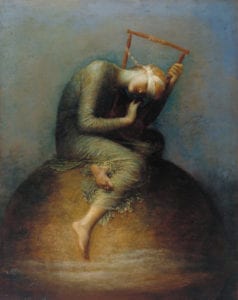 This kind of feeling-toned guest is called a complex. The word complex is one that we throw around lightly in conversation. But a complex is anything but “light.” Complexes are often heavy and dark. Not taking them seriously leaves our ego permeable to a full-on invasion which can drag us into prolonged states of discontent or disorientation, i.e. prolonged states of misidentification with the mind’s manifestations.
This kind of feeling-toned guest is called a complex. The word complex is one that we throw around lightly in conversation. But a complex is anything but “light.” Complexes are often heavy and dark. Not taking them seriously leaves our ego permeable to a full-on invasion which can drag us into prolonged states of discontent or disorientation, i.e. prolonged states of misidentification with the mind’s manifestations.
Who are these unannounced, psychic visitors? From where do they come?
A lot of things can trigger a complex. For example, something simple such as a look someone gives you or an unassuming comment someone makes. They can also be triggered by something deeper like jealousy and insecurity.
According to Jung, a complex has a will of its own. The word Jung used to describe this feature of complexes was autonomous. Having autonomy means that complexes possess enough psychic energy to change our normal perspective on life, and as such, they act upon us like any other object in the world. The “beyond” from which they come is the Unconscious.
The Autonomy of Complexes
In Two Essays on Analytical Psychology, Jung writes:
I recognize that there is some psychic factor active in me which eludes my conscious will in the most incredible manner. It can put extraordinary ideas into my head, induce in me into unwanted and unwelcome moods and emotions, lead me to astonishing actions…C.G. Jung
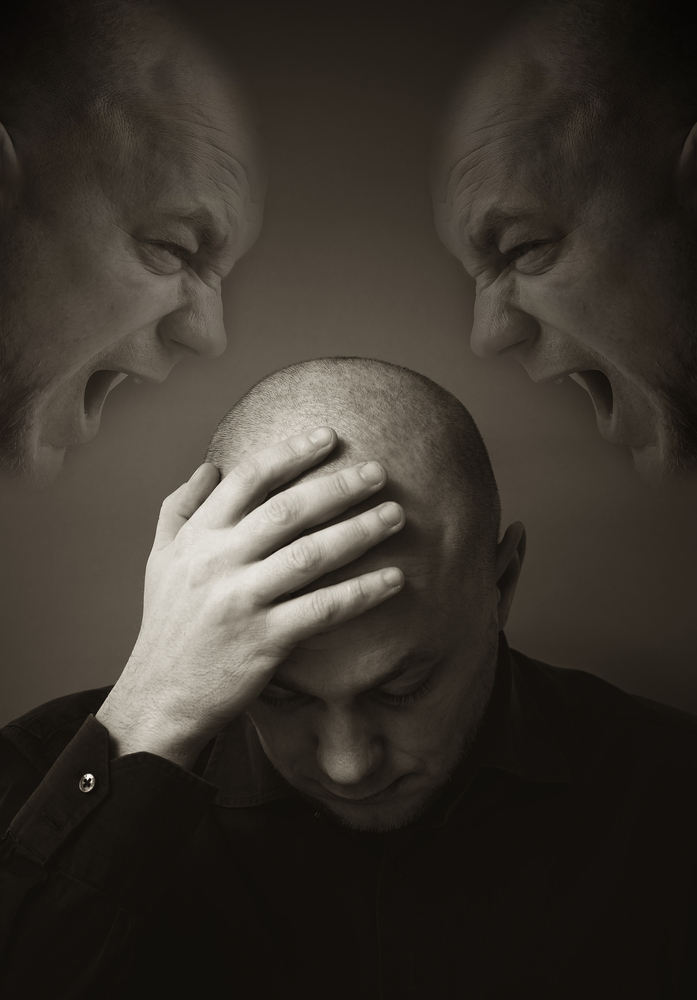
Understanding that complexes possess this kind of autonomy is one of the keys to learning how to successfully work with them. That knowledge helped me to distinguish the complex from me. When a complex overpowers us, we see the world through a very different lens. Something in which we normally trust becomes suspect, or we may become particularly pessimistic, dark, cocky, or cynical. Complexes also have the power to distort our faces, as well as change the tone of our voice, both the voice we use with others and, especially, the one we use in our internal dialogue.
Identifying this other in ourselves is the first step in breaking ourselves free of complex-behavior. When we identify with the moods or thoughts associated with the complex, we are unconsciously identified with the complex. We believe our distorted perspectives about the world, about others, and about ourselves.
Again from Jung:
…identification with an autonomous complex is the essential reason why it is so difficult to understand and describe the problem… We always start with the naïve assumption that we are masters in our own house. Hence we must first accustom ourselves to the thought that, in our intimate psychic life … we live in a kind of house, which has doors and windows to the world, but that, although the objects of this world act upon us, they do not belong to us.Two Essays in Analytical Psychology
Self-Help: Working with States of Anxiety and Depression
How can we greet these moods at the door of our awareness and welcome them? How can such seemingly dark guests be approached as Guides who can clear us out for some new delight?
One should cultivate the art of conversation with oneself … without regard to our rational criticism. So long as the affect [the mood] is speaking, criticism must be withheld… Any humbug is of course quite useless.C.G. JungThe internal dialogue is an opportunity to witness some of our complexes at work. Complexes are the ones playing the character of the “the other”.
I am not talking here about the Gestalt approach of talking to a pillow. The kind of internal dialogue I am talking about reaches much deeper than does having a conversation with a pillow. Imagery for this kind of dialogue – indeed the dialogue itself! – should arise spontaneously. To use something like a pillow for this kind of work doesn’t allow the image to form out of its own nature. And, by that, I mean that all of our psychic process and moods will express themselves in image form. This is the material of our dreams.
 Now are approaching one of the reasons why learning to distinguish various mindstates and dimensions is important – we need to use them for our inner work. The stronger we become in establishing ourselves in stillness, the stronger the stimulus barrier around our ego. We can then allow our visitor to speak, as Jung says above. Very often it is trying to tell us something about ourselves of which we are unaware. In this conversation, stillness and movement interact – we are not trying to turn off the mood. We are trying to sink into it. This idea of the interaction of stillness and movement is further described in my post on Meditation for Psychological Transformation.
Now are approaching one of the reasons why learning to distinguish various mindstates and dimensions is important – we need to use them for our inner work. The stronger we become in establishing ourselves in stillness, the stronger the stimulus barrier around our ego. We can then allow our visitor to speak, as Jung says above. Very often it is trying to tell us something about ourselves of which we are unaware. In this conversation, stillness and movement interact – we are not trying to turn off the mood. We are trying to sink into it. This idea of the interaction of stillness and movement is further described in my post on Meditation for Psychological Transformation.
Dream Interpretation: Anxiety and Depression
Complexes spontaneously arise in image-form in our dreams. They can take on any number of manifestations like apartment or shopping complexes, intricate structures like mazes or labyrinths, as well as strange people coming into our home and taking over. How we respond to these images in the dream sheds light on where we stand in relationship to our complexes. Are we overpowered or empowered? If we are empowered, what gave us that energy? Was it a character in the dream that embodied an aspect of courage that we need to assimilate? In like manner, if we are disempowered, then we can be sure that that the dream is trying to bring this to our awareness. Here, at the very least, we can be grateful that we have been given a picture of a psychic situation with which we are unconsciously identified.
In sum, becoming aware of our dreams as Guides from beyond is one of the ways in which we can welcome our unannounced guests. We can entertain them through an active, non-judgmental, inner dialogue approached as a sort of meditation or reflection. We can then utilize the energy of our dark moods to draw us into the inner dialogue, where once again we find that the answers we seek are within us.




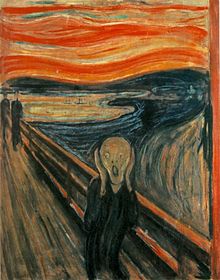
i am a male, 26 years old. i find it difficult in life trying to do new things for myself, somewhere in my mind i see my my self so higher which i do not know if is good or bad. i have this feeling about my dead father which is so very negative. i think he wasted my and did nothing good for me, and inside my heart i only speak ill of him.
i am unemployed and also have the fear of working for someone and also a shy person and antisocial.
i had a dream recently, in the dream , i saw my dead father and he said as i quote “son go out and do something for yourself, i replied, what should i go and do, what did you teach me, what work did you sent me to learn, he was quiet. then i started to ask him a judgmental question, saying WHY DID YOU COME FOR ME FROM MY MOM WHEN I WAS LITTLE, WHY .
he went inside, took two canes and starting whipping me the canes all over my body, in the beginning i felt the pains from the whipping so i struggle with him and took one cane from the two canes he brought to whip me, i wanted to whip him with the cane i had struggle and took from him, but deep inside the dream something tells me not to it, so i didn’t fight back but rather i stayed calm and receive his whipping, as he continue whipping i felt the pain no more then i wake up.
i am pissed at my dad spirit and haven’t shown him respect yet because i do not understand why he was beating me for a question i wanted to know …….
even when he was alive
i hated him for taking me from my mom
ever since i was young i wanted him dead
Hi Patrick, this is an important dream. Have you read the post Dreams About Fathers, Freeing Your Mind From Unconscious Influence? I think it would be helpful.
This father in your dream, he is the inner figure of the father and not your actual father. What he said was true: you do need to go out and do something. Psyche wants this from you, not your actual father.
This beating is severe, but something like this used to happen to boys in primitive rituals. If they resisted stepping into manhood, the male members of tribe beat them…and in severe cases, actually killed them.
Because I don’t know your situation, I can’t say much more. Clearly there is healing work to be done with whatever happened with your actual father. This is what holds you back, but keep the father-image in your psyche and the real father separate.
Jesamine,
This is a fantastic introduction as I delve into Jungian works. Thank you, primarily for helping me create a link between viewing anxiety and depression as symptoms of a psychic struggle. It is clearer than ever now that these emotions are indicators of a much deeper level of distress.
Warmest,
JA
Hi JA, thanks for commenting. I am very happy to hear that it helped…
“ Once you can reach that raw energy state you have to sit with it. Now, there’s a tremendous amount of tension in this raw energy, and, it can be quite difficult to bear it. Don’t get pulled back into blaming some external cause. Stay with the tension of that raw energy. One of Jung’s most amazing Red Book discoveries was that this raw energy will form an image of itself – an image with which you can have a dialogue.”
The end of this statement is where I lose the plot sorta speak. If after sitting with literally indescribable mental torment – torment that feels like a nameless, faceless evil toxic presence bent on making you jump off a bridge – one can expect to see an image with which to engage? I can’t tell if this is literal or metaphorical. I would love to get a clarification.
Thanks for this exceptional article. It’s very helpful and informative.
Hi Russell, there is no “plot” here. I am speaking about the reality of the psyche, in the same way Jung meant it. The image is real, not metaphorical. This is the essence of Jung’s approach to psychology. If you aren’t familiar with him, I can see how this might sound strange. Psyche, but its very nature, forms images of its energies.
Can you please recommend a book for my 21 year old son. He is suffering from social anxiety and depression. He is stuck.
Can you please recommend a book for my 21 year old son. He is suffering from social anxiety and depression. He is stuck.
Hello, I am sorry to hear that your son is suffering. I don’t come from the “recommend a book” perspective because I don’t think it helps. I work with individuals.
I recently had a dream about my biological mother who I have never met before. She looked old and frail. When we met we didn’t click until she used the very little money she had to buy me gifts. I broke down crying. and we embraced.
then soon after this dream I dreamt that she was in the hospital with a friend speaking Korean, a language I never learned. she was dying and had cancer.
was this quite literal? I’ve been neglecting my paperwork to start my search for her and I wonder is this a message?
Hi Jesamine, Let me first say thanks for giving me somewhat of a clarification when it comes to Jungian. I’m a new grad student who is struggling with carl jungs approach to counseling. Oh I’m quoting you in one of my papers, how can i cite you from this website? thanks again forthe help.
I would suggest looking the APA guidelines (or whichever ones you have to follow for your paper) on quoting websites.
Hi Jesamine, thank you
I feel like I have had (what I know now as) depression all of my life. I don’t remember a time when it wasn’t there…the everything is pointless, everyone hates me, woe is me 🙂 feeling. I added anxiety later
I could tell a bunch of stories about my parents nobody wants to hear but… one of my earliest memories is waking up and sitting up in bed. It was too quiet in the house – there were 6 of us, I was the youngest. I was on the top bunk by the window. I looked out and saw everyone in the car just getting ready to back out. The engine starting must have woken me. I thought they were all leaving me. My mom must have seen me looking out the window, she came back in and got me. She was very irritated about that… getting me dressed and out the door and making everyone wait. I don’t know how old I was, I would guess 5 or younger.
I am on medication and have been to therapy that did the CBT… but I have found that meditation has helped me the most so far.
I’m glad I found your site, I am going to be here a while
thank you
Hi Fred, thanks for sharing!
What if you don’t remember your dreams?
Or you forget them moments after you wake up even tho you told yourself you need to remember that?
Hi Jackie, this is a common problem. If you start doing some depth work, such as painting or journaling your moods – or perhaps, start a Jungian Analysis – it could get things stirring. Your dreams are there; your conscious mind is not tapping into them. Do you have a meditation practice? There are many ways to access the depths. Once you do, your dreams should become more memorable. I have a new client who said in her first email, “I don’t remember my dreams,” but the night after she’d made her appointment, she started remembering them. Now, she brings several each week.
I find myself overwhelmed by real problems — like having money for and ming house repairs — yet these problems get blown up into catastrophes in my mind. If I talk to other people, they tell me unhelpful, negative things. I want to rid myself of these awful moods (normally I am a positive and happy man), and I want to get to the root of them. I have read much of Jung and would go yo an analyst if I could afford it.
Are there any practical how-to manuals/websites for using Carl Jung personally? I am presently reading The Basic Writings of CG Jung and have used a Jungian Dream Interpretation article several times, to moderate success
I am working on that actually. Hopefully, you are signed up for the upcoming Zoom seminars!
I’m trying to understand Jungian Psychology for the first time. Is there a list of summary points about his ideas I can refer to?
Does Jung mean to say that our unconscious mind (the so called complexes) results in these anxious or depressive thoughts and that these thoughts are communications from the unconscious mind to tell us something is wrong. How do we know these thoughts are justified or is it just a trick/irrational thought being played out by the complexes?